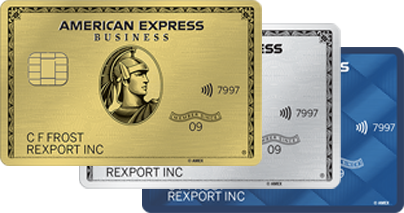
How to Get a Business Credit Card
By Frances Coppola | American Express® Freelance Contributor
5 Min Read | May 11, 2022
Summary
A business credit card can help you manage cash flow for your business, earn rewards, build business credit history, and keep business and personal finances separate, among other advantages. Many business owners find business credit cards invaluable, particularly to meet startup expenses and cover seasonal stock variations.

Who Can Apply for a Business Credit Card?
It’s often thought that business credit cards are for corporations. But there are different types of credit cards designed for small businesses. Even sole proprietors, or freelancers and gig workers who are self-employed only part of the time, can often qualify for a business credit card. So, whether you’re a student driving for hire in your spare time, or a single mom running a business from your home, or the director of a company employing 50 people, you can apply for a business credit card.
You also don’t need to have an established business to get a credit card. Card issuers are often willing to consider businesses that aren’t making any money yet but have a reasonable expectation of doing so. Many people use business credit cards to meet the initial expenses of their new business ventures.
You can apply through online forms for most business credit cards.
What Information do Business Credit Card Issuers Require?
Your prospective credit card issuer is likely to ask for the following information:
- Legal name of your business. If your. business is a corporation or partnership, this is the name that you registered with your state government. If you’re a sole proprietor, this is your own name.
- The business’ tax reference ID. For corporations and partnerships, this is the Employer Identification Number (EIN) issued by the IRS. For sole proprietors, this is most likely your Social Security number, unless you have an EIN.
- Legal structure of the business. If you have an LLC, is it a corporation or a partnership? Or are you the sole owner?
- Industry in which your business operates. When making the credit card application, there’s typically a list of industries for you to choose from. If your business doesn’t appear to fit into any of them well, just choose the closest match.
- Your role in the business. For example, owner, president, or general manager.
- Business mailing address. If you’re running your business from home, this is your home address. You’ll probably also need to provide a telephone number and email address.
- Age. How many years the business has been operating.
- Number of employees. How many employees the business has. If you’re a sole proprietor or a single-person LLC, it’s 1.
- Annual revenue. If your business is just starting up, it’s fine to put “zero.” However, the card issuer might ask for a forecast showing your expected future revenue.
- Expense estimate. Your expected monthly expenditure on your business credit card.
Card issuers may also ask you for personal information such as your date of birth, your household income, your home address and telephone number, your Social Security number, and your mother’s maiden name.

Credit Checks and Guarantees - How to Qualify for Business Credit Card?
Whether you qualify for a business credit card depends in part on your credit score. Most business credit card issuers want a good to excellent credit score. Fortunately for new businesses, the credit score doesn’t have to be from your business alone. Your personal credit score can also be taken into account. For more credit score information, read “Credit Score Ranges: What is an Excellent, Good, or Poor Credit Score?”
The card issuer will check your business’ credit score first. There are several bureaus that record business credit information, but the issuer may do their own credit scoring using information that you provide, such as your business plan and cash flow forecast.
If your business doesn’t meet the issuer’s credit criteria, then the issuer will check your personal credit score. If you have a good to excellent score (670-850 points) your application for a business card may be accepted even if your business credit score is low or non-existent. The credit limit and interest rate on the card will then be based on your personal credit score. Credit limits on business credit cards are typically higher than on personal credit cards, which can be a boon for a new business – and some business cards have no pre-set spending limit – see “Key Differences Between Business and Personal Credit Cards”.
You may additionally be asked to sign a personal guarantee. This means that if the business fails to make payments in accordance with the terms and conditions, the card issuer can recover the balance directly from you.
Some card issuers will accept applications from people with low credit scores, but the interest rate on the card is likely to be high and they may require a security deposit.

Find the Card you've been looking for
Explore Business Credit Cards built for businesses like yours.






